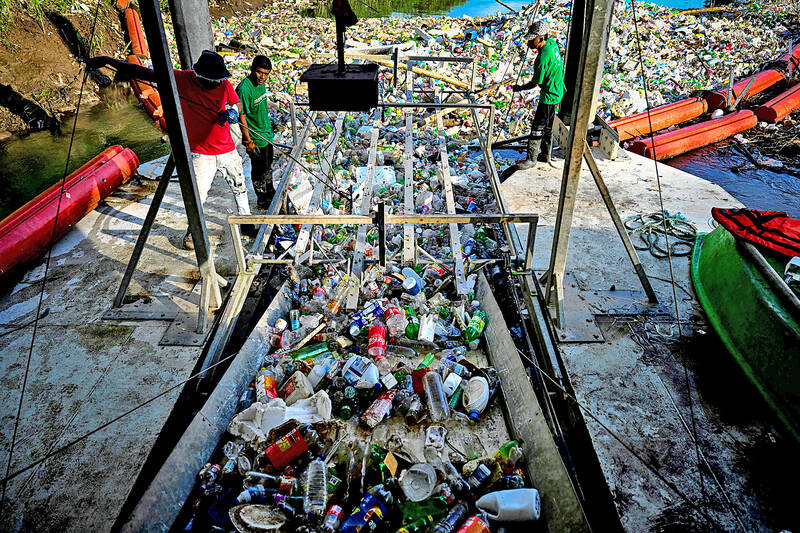A trash-collecting machine powered by a water wheel and solar panels has prevented hundreds of tonnes of plastic and other garbage from Panama from littering mangroves and the ocean.
All kinds of trash flow down rivers running through Panama City and end up on the coastline of the Central American nation.
To combat the pollution, the nonprofit Marea Verde Foundation installed a machine called Wanda two years ago to collect and separate trash for recycling.

Photo: AFP
“We’ve captured 256,000 kilos of waste that would be in the mangroves and sea if it had not been for Wanda,” said Laura Gonzalez, the foundation’s executive director.
The garbage is stopped by a barrier across the Juan Diaz River that runs through Panama City before several workers separate the waste, which is sent by a long conveyor belt to a huge container to be recycled.
Wanda also has solar panels in case the hydropower system that harnesses the energy of the river current fails.
No other river in Panama has a similar system, so tonnes of garbage continue to reach the sea.
The country’s coastal mangroves are a vital resting place for hundreds of thousands of migratory birds, but pollution and urban growth pose a serious threat.
Uncollected garbage litters the streets and residential areas of Panama City and its surrounding areas, while on the coast, there are piles of all kinds of waste.
Panamanian Minister of the Environment Juan Carlos Navarro in July called the state of the rivers an “environmental disaster.”
“We cannot continue polluting our rivers and seas,” Navarro said.
The trash captured by Wanda includes plastic bottles, shampoo containers and soccer balls.
“It’s crazy. We received a plastic unicorn a few days ago,” Gonzalez said.
There are eight other similar facilities around the world, including one in Baltimore, Maryland, but Wanda is the only one of its kind in Latin America, Marea Verde said.
It began operating in September 2022 and captured about 120 tonnes of waste in its first year.
However, the amount of trash dumped in the river continues to increase.
“This year we will probably exceed what we collected in the first year,” Gonzalez said.

VAGUE: The criteria of the amnesty remain unclear, but it would cover political violence from 1999 to today, and those convicted of murder or drug trafficking would not qualify Venezuelan Acting President Delcy Rodriguez on Friday announced an amnesty bill that could lead to the release of hundreds of prisoners, including opposition leaders, journalists and human rights activists detained for political reasons. The measure had long been sought by the US-backed opposition. It is the latest concession Rodriguez has made since taking the reins of the country on Jan. 3 after the brazen seizure of then-Venezuelan president Nicolas Maduro. Rodriguez told a gathering of justices, magistrates, ministers, military brass and other government leaders that the ruling party-controlled Venezuelan National Assembly would take up the bill with urgency. Rodriguez also announced the shutdown

Civil society leaders and members of a left-wing coalition yesterday filed impeachment complaints against Philippine Vice President Sara Duterte, restarting a process sidelined by the Supreme Court last year. Both cases accuse Duterte of misusing public funds during her term as education secretary, while one revives allegations that she threatened to assassinate former ally Philippine President Ferdinand Marcos Jr. The filings come on the same day that a committee in the House of Representatives was to begin hearings into impeachment complaints against Marcos, accused of corruption tied to a spiraling scandal over bogus flood control projects. Under the constitution, an impeachment by the

Exiled Tibetans began a unique global election yesterday for a government representing a homeland many have never seen, as part of a democratic exercise voters say carries great weight. From red-robed Buddhist monks in the snowy Himalayas, to political exiles in megacities across South Asia, to refugees in Australia, Europe and North America, voting takes place in 27 countries — but not China. “Elections ... show that the struggle for Tibet’s freedom and independence continues from generation to generation,” said candidate Gyaltsen Chokye, 33, who is based in the Indian hill-town of Dharamsala, headquarters of the government-in-exile, the Central Tibetan Administration (CTA). It

A Virginia man having an affair with the family’s Brazilian au pair on Monday was found guilty of murdering his wife and another man that prosecutors say was lured to the house as a fall guy. Brendan Banfield, a former Internal Revenue Service law enforcement officer, told police he came across Joseph Ryan attacking his wife, Christine Banfield, with a knife on the morning of Feb. 24, 2023. He shot Ryan and then Juliana Magalhaes, the au pair, shot him, too, but officials argued in court that the story was too good to be true, telling jurors that Brendan Banfield set